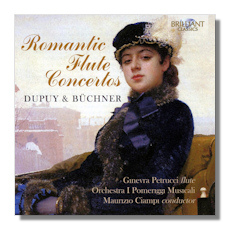
The Internet's Premier Classical Music Source
Related Links
- Latest Reviews
- More Reviews
-
By Composer
-
Collections
DVD & Blu-ray
Books
Concert Reviews
Articles/Interviews
Software
Audio
Search Amazon
Recommended Links
Site News
 CD Review
CD Review
Romantic Flute Concertos

- Edouard Dupuy: Concerto for Flute & Orchestra in D minor
- Ferdinand Büchner: Concerto for Flute & Orchestra #1 in F minor, Op. 38
Ginevra Petrucci, flute
Orchestra I Pomeriggi Musicali/Maurizio Ciampi
Brilliant Classics 95192 58:43
The liner notes on the composers are nearly more interesting than the concerti themselves, which are in an event very tuneful creations. Edouard Dupuy (or Jean-Baptiste-Édouard Du Puy c.1770-1822) lived one heck of a life; though he sang the title role in the Danish premiere of Don Giovanni (Mozart!), he was also expelled from several kingdoms and countries for a curious mix of affairs and lapses in common sense. Büchner (1825-1912) was completely different. Born in Germany three years after the death of Dupuy – he went on to live an astonishing 62 years in Russia, becoming principal flute of the Imperial Theater and the first professor of flute at the Moscow Conservatory.
The two Romantic-period concertos here aren't exactly forgotten masterpieces, but I imagine that flautists will be more than happy to make their acquaintance. The Dupuy is in a minor key, but is largely a happy and enjoyable work. The orchestration holds little innovation but manages to have impressive moments here and there. The songful slow movement is typically elegant and is capably handled by soloist and orchestra. I had not heard of Ginevra Petrucci, but the twenty-something virtuoso has a lovely tone and captures the whimsical spirit of this music very well. In an age where youthful players have to play "the same old stuff", it's especially gratifying to see a young artist supported by a label such as Brilliant Classics in exploring unusual repertoire for her instrument. The Finale finds Petrucci having fun and simply enjoying the myriad runs and trills that are rather unimaginatively scattered between equally unimaginative orchestral fanfares. Whatever my subjective opinions, this has to be a hoot – pardon the pun – to play, and the accompaniment is at least well-conducted and committed.
The Büchner is at once more arresting, with a darker and more imposing orchestral framework. It's again not the most innovative writing in the world, but the flute part is pretty special. Compared to the Dupuy, the solo line features greater emotional depth and is more inventive, even if the music doesn't retain its gritty outlook for more than a few minutes. Petrucci correctly recognizes that the piece has greater range, and explores both the playful and serious moments throughout the work equally well. Maurizio Ciampi's job is to keep the music moving, and that's exactly what he does. Although the orchestra doesn't have much to do, they do their job, too. The flute isn't obnoxiously spotlighted, Ginevra Petrucci's good looks aren't needlessly exploited, and the sound is very good. Flute players and those who appreciate the evolution of the Romantic concerto will both find this a worthy – if not entirely mandatory – purchase.
Copyright © 2015, Brian Wigman





















